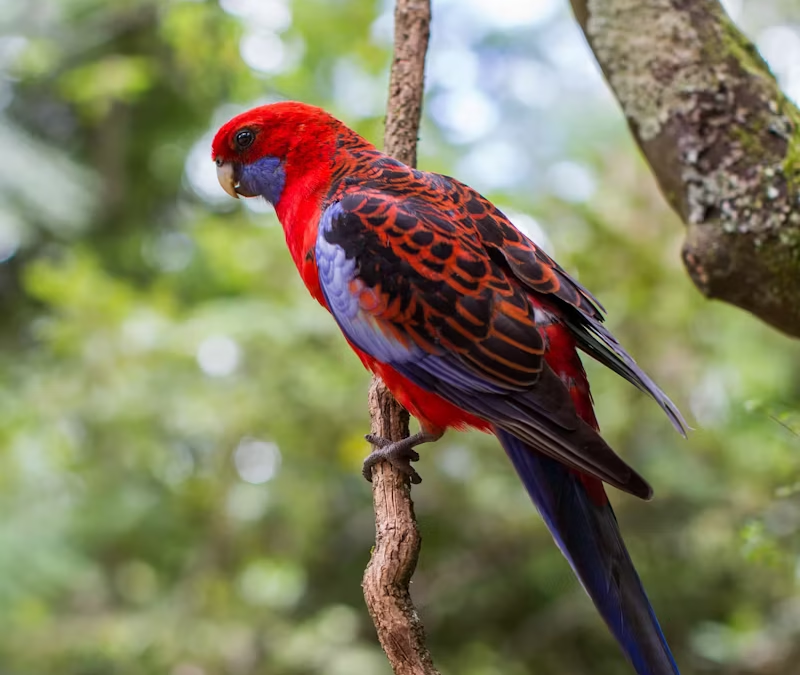Protecting Your Parrot
Guarding Your Parrot: Keeping Your Feathered Companion Safe and Healthy
Parrots are intelligent, sensitive, and loving companions. Whether you have an African Grey, Macaw, Cockatoo, or Conure, keeping your parrot safe goes far beyond feeding and housing them—it’s about creating a secure, stimulating environment and protecting them from common dangers.
In this comprehensive guide, we’ll go over the most important steps in protecting your parrot—both physically and emotionally. Everything you do, from household hazards and nutrition to emotional well-being and socialization, makes a difference in keeping your bird happy, healthy, and long-lived.
Provide a Safe and Stimulating Home Environment
The first step in protecting your parrot is evaluating its living space. Parrots are curious and enjoy investigating, so your home must be bird-proofed to avert mishaps.
Some of the safety tips in the home:
• Avoid ceiling fans: Never let your bird out when fans are running—they’re invisible hazards in flight.
• Cover windows and mirrors: Birds will fly into reflective surfaces; use decals or curtains.
• Safeguard electrical cords: Parrots love to chew, and cords present a significant shock hazard.
• Know which houseplants are toxic: Plants like philodendrons, lilies, and pothos are toxic when ingested.
• Remove access to small objects: Beads, jewelry, coins, and rubber bands can all be a choking hazard.
A huge, clean cage with safe bar spacing is a necessity, but out-of-cage time when supervised is also a requirement—just make sure it’s in a safe, controlled area.
Avoid Toxic Substances and Foods in order to Protecting Your Parrot
Certain household items are poisonous to parrots even in small amounts. Parrots are unlike other pets in that they possess sensitive respiratory systems and can absorb poisons through air or skin.
Never expose your parrot to:
• Teflon (PTFE) fumes: Found in non-stick coatings; lethal when overheated.
• Aerosols and perfumes: Strong scents and chemicals can be irritating or harmful to respiratory passages.
• Cigarette smoke: Poisonous both as a contact and airborne toxin.
• Incense and scented candles: Even natural ones emit harmful fumes.
Foods not safe for parrots:
• Avocado
• Chocolate
• Alcohol
• Caffeine
• Onion and garlic
• Raw beans
• Salt and sweet treats
Maintain a balanced diet of nutritious pellets, fresh fruit, vegetables, and minimal seeds for health and immunity.
Provide Mental Stimulation and Emotional Safety of Protecting Your Parrot
Protection is not just physical—parrots also need emotional and mental protection. Parrots live in social flocks in the wild, interacting constantly with others. Boredom or loneliness in captivity can lead to extreme behavioral problems.
Tips for emotional protection:
• Talk to your parrot daily: Parrots need communication to feel connected.
• Rotate toys weekly: Prevent boredom by changing foraging and puzzle toys.
• Positive reinforcement training: Builds trust and confidence.
• Respect their personal space: Know their body language and do not force interaction.
Ignored or depressed parrots may begin feather plucking, screaming, or self-mutilation, so be attentive to their mental well-being.
Maintain Hygiene and Health Care
Proactive health care and daily cleaning are essential to protecting your bird from infection, parasite, or illness brought on by stress.
Hygiene hints:
• Clean cage daily: Drop droppings, food waste, and dirty bedding.
• Wash dishes with mild soap: Strong cleaner residue should be avoided.
• Replace toys when worn out: Splinters and frayed ropes can harm.
Health tips:
• Make annual vet checkups with an avian specialist.
• Weigh your bird every week to catch weight loss early.
• Monitor droppings: Abrupt changes can indicate illness.
• Trim nails and beak only when needed, ideally by a professional.
Illness can be detected early to save your bird’s life, as parrots tend to conceal symptoms until they are severe.
Limit Exposure to Other Pets and Strangers
While parrots are social, their exposure to other animals or people should be done carefully. Sudden exposure to strangers, loud noises, or aggressive pets will frighten or stress your bird.
Social safety guidelines:
• Never leave your parrot unattended with dogs, cats, or small children.
• Introduce visitors slowly and allow your bird to approach them on its own.
• Avoid excessive stimulation at parties or loud gatherings.
Keeping your parrot secure includes understanding that they adore routine and predictability. Overexcitement will lead to fear-based aggression or anxiety.
Emergency Preparedness
Being prepared in case of an emergency will go a long way in keeping your bird safe in the situation of a natural disaster, injury, or illness.
Prepare by:
• Having a parrot-specific first aid kit on hand.
• Knowing the location of the closest avian veterinarian.
• Having a carrier or travel cage on hand in case of evacuation.
• Creating a secure room where your bird may stay in the event of repairs or visitors disrupting your home.
Final Thoughts: Protect with Love, Knowledge, and Consistency
Parrots are sensitive, intelligent, and highly dependent on their human caregivers. Protecting your parrot involves more than sheltering and feeding them—it involves discovering their needs, avoiding hazards, and building a relationship based on trust, love, and engagement.
When you bird-proof your home, you’re not just preventing injury to your parrot—you’re also enabling them to flourish.
SEO Keywords: keeping parrots safe, parrot protection, parrot safety, bird-proofing your home, toxic foods for parrots, parrot care, how to keep a parrot safe, safe conditions for parrots

